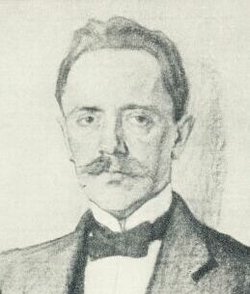The directory «Plots»
Baltrušaitis Jurgis
(1873—1944)

Jurgis Baltrušaitis was a Lithuanian poet and a literary translator, who wrote in Lithuanian and Russian.Baltrušaitis was born to a family of farmers in Paantvardis village near Jurbarkas, Lithuania. In 1885 he entered Kaunas gymnasium, and graduated from there in 1893; he then entered the Faculty of Physical and Mathematical Sciences at Moscow University. At the same time he attended lectures in the Faculty of History and Philology, and studied foreign languages; he learned 15 foreign languages during his life. From 1895 onwards, Baltrušaitis began to collaborate in the publication of Moscow literary magazines, and he began his own his creative work in Russian. Baltrušaitis became a poet of the symbolist trend. In association with Sergei Polyakov he established the publishing house “Scorpio” which published the chief Russian Symbolist magazines such as Vesy and Severnyie Tzvety as well as collections of the greatest Russian Symbolist poets. Baltrušaitis was a close friend and colleague of such famous Russian writers and artists as Anton Chekhov, Konstantin Balmont, Valery Bryusov, Vyacheslav Ivanov, Maksim Gorky, Konstantin Stanislavsky, Mikhail Vrubel, and Nikolai Skryabin; Boris Pasternak was the private home tutor of Baltrušaitis’s children. In short, he was a true member of the Moscow cultural elite.
Baltrušaitis published three collections of poetry in Russian, and another three in Lithuanian. He made many Russian translations of modern literature by such writers as Henrik Ibsen, Oscar Wilde, August Strindberg, Knut Hamsun, and Gabriele D’Annunzio. His translation of Hunger by Knut Hamsun is considered a classical rendering of this work into Russian and has been continuously republished right up to contemporary times. He was also one of the foremost exponents of iconology.
Between 1900 and 1914 Baltrušaitis often visited and lived in the countries of Western Europe, Italy and Norway. He spent the years of World War I and the Russian Revolution in Russia, where he actively participated in the Lithuanian political struggle for independence. In 1919 he was elected President of the Russian Union of Writers, and is known for his efforts to help and rescue many writers and intellectuals during the first years of the Bolshevik regime.[1]
Baltrušaitis was appointed ambassador of independent Lithuania to Russia in 1920, and he held this position until 1939. In 1932 he was honored with the award of a doctorate honoris causa by Vytautas Magnus University in Kaunas. In 1939 Baltrušaitis was appointed a counselor of the Lithuanian embassy in Paris. His son, Jurgis Baltrušaitis Jr., an art historian and art critic, was also a Lithuanian diplomat during the years of annexation of Lithuania, when the Lithuanian diplomatic service continued to defend Lithuanian interests in some Western countries. Baltrušaitis died in Paris on January 3, 1944; he is buried at Montrouge cemetery.
Lithuania, 1998, Jurgis Baltrušaitis